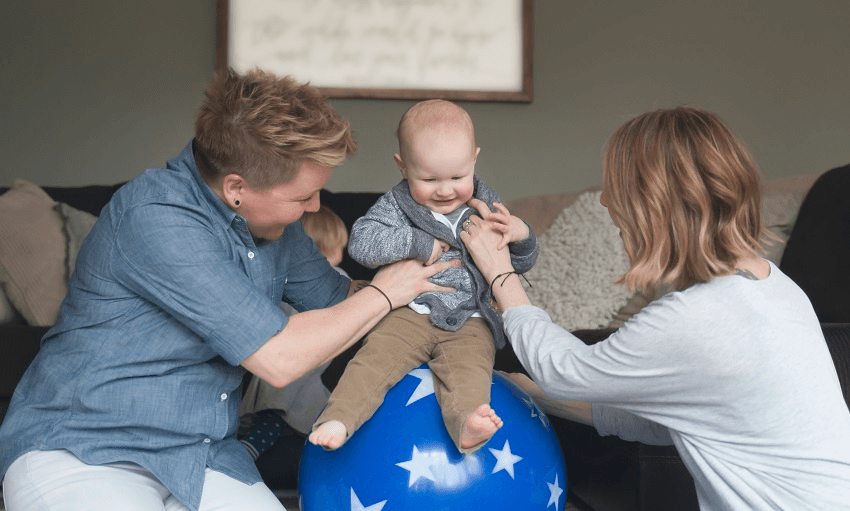Even if you can’t have kids naturally, that doesn’t mean you don’t deserve to be a parent, writes Sharyn Graham Davies.
“If you can’t have kids naturally through heterosexual intercourse, then you’re not meant to have kids. We already live in an over-populated world. There are almost 8 billion of us.”
“We shouldn’t waste time, energy and money trying to enable people who leave it too long or want to be involved in same-sex relationships, or have a disability to have children.”
“If you can’t have children naturally you are not meant to reproduce.”
These provocative thoughts are not as uncommon as you may think. When I tell people about our current Marsden project, these are some of the reactions I get. Many of these reactions come from a place of care. For instance, my 11-year-old son absolutely wants everyone to be able to have children, regardless of gender, sexuality, ability etc. But he worries that there are already too many people on the planet, and he’s not wrong. But the way to limit population is not by denying people the ability to create families, it is by enabling people, and particularly women, to have actual choices and control over their own fertility.
Other reactions I get though stem from a place of hate and fear. Some people think that if you can’t have kids naturally then that’s social Darwinism in practice. In other words, only the best, brightest and fittest should reproduce, moving humanity generation after generation to a higher form of evolution. If, however, people who are unable to reproduce naturally are assisted to have children through technologies such as IVF, the potential of the human race will be reduced, and we will end up (*cue foreboding music*) with a generation of helpless and hapless snowflake children.
Such scaremongering is not only unhelpful but blatantly untrue. Parents who go through the extraordinary hoops to employ reproductive technologies to have children are often far more dedicated parents than those who just happen to forget a condom. Indeed, research shows that kids with LGBT parents are some of our best and brightest and the kids I know absolutely reinforce this. And while parents with disabilities might need extra support to conceive and raise children, why should they miss out on the rewarding, and quite frankly, exasperating (as I write this my kids are fighting over whose turn it is to do the dishes) experience of creating families?
Rather than punish people with disabilities by further excluding them from experiences others take for granted, why not build a society that grants the same opportunities to all? Rather than deny them the right to kids, why don’t we create a world where they are able to have and raise children? That is the world I want to live in.
The United Nations guarantees people the rights to have children. But in reality, many people are unable to have children without assisted reproductive technologies. But these technologies are not accessible to all on an equal basis. You need money to pay for them and you need to be ready to engage with a predominately white and western medical system. If you want to get a government subsidy then its best to be able to show you’ve been trying for a while (hence, it’s helpful to be heterosexual) and that you’re a fit healthy person who doesn’t smoke and has the right BMI. In other words, if you want to get fast-tracked for IVF and other assisted reproductive technologies, you need to be rich, white, heterosexual and able-bodied. This seems totally unfair.
Our current Marsden project will explore new family formations in Aotearoa and importantly, examine how people denied access to new reproductive technologies create families. If you are heterosexually married and wealthy, with an appropriate BMI and age, you can go to the top of the list for accessing subsidised assisted reproductive technologies. But if not, you can be excluded and without the money to pay privately for IVF and other services, having children may not become a reality. Access to assisted reproductive technologies is thus much harder for our Māori, Pacific, LGBTQI and new migrant communities, as well as those with disabilities.
In pushing Aotearoa toward being a fair and just society, where everyone who wants to create a family can, we are embarking on an innovative research topic. Generously funded through the Marsden fund, over the next three years, we will be investigating the issue of social equality and new family formation. As part of this project, we are looking for a PhD scholar to join our team on a full scholarship, worth $27k per year over three years.
Anyone can apply for this scholarship, and we particularly encourage applications from people with close links to Māori or Pacific communities, or who can connect with our LGBTQI, Muslim or disabled communities. The candidate will develop their own specific research topic within the broad area of family formation and assisted reproductive technologies.
For more information email Sharyn.davies@aut.ac.nz
